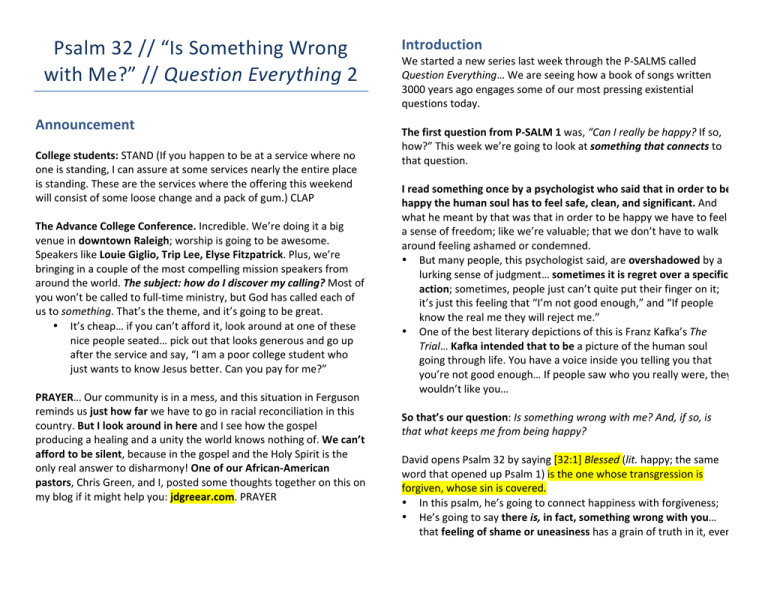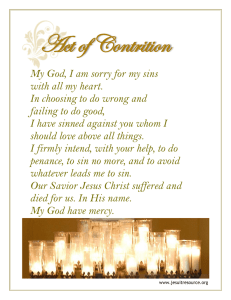2-Psalm-32-Is-Something-Wrong-with-Me1
advertisement

Psalm 32 // “Is Something Wrong with Me?” // Question Everything 2 Announcement College students: STAND (If you happen to be at a service where no one is standing, I can assure at some services nearly the entire place is standing. These are the services where the offering this weekend will consist of some loose change and a pack of gum.) CLAP The Advance College Conference. Incredible. We’re doing it a big venue in downtown Raleigh; worship is going to be awesome. Speakers like Louie Giglio, Trip Lee, Elyse Fitzpatrick. Plus, we’re bringing in a couple of the most compelling mission speakers from around the world. The subject: how do I discover my calling? Most of you won’t be called to full-­‐time ministry, but God has called each of us to something. That’s the theme, and it’s going to be great. • It’s cheap… if you can’t afford it, look around at one of these nice people seated… pick out that looks generous and go up after the service and say, “I am a poor college student who just wants to know Jesus better. Can you pay for me?” PRAYER… Our community is in a mess, and this situation in Ferguson reminds us just how far we have to go in racial reconciliation in this country. But I look around in here and I see how the gospel producing a healing and a unity the world knows nothing of. We can’t afford to be silent, because in the gospel and the Holy Spirit is the only real answer to disharmony! One of our African-­‐American pastors, Chris Green, and I, posted some thoughts together on this on my blog if it might help you: jdgreear.com. PRAYER Introduction We started a new series last week through the P-­‐SALMS called Question Everything… We are seeing how a book of songs written 3000 years ago engages some of our most pressing existential questions today. The first question from P-­‐SALM 1 was, “Can I really be happy? If so, how?” This week we’re going to look at something that connects to that question. I read something once by a psychologist who said that in order to be happy the human soul has to feel safe, clean, and significant. And what he meant by that was that in order to be happy we have to feel a sense of freedom; like we’re valuable; that we don’t have to walk around feeling ashamed or condemned. • But many people, this psychologist said, are overshadowed by a lurking sense of judgment… sometimes it is regret over a specific action; sometimes, people just can’t quite put their finger on it; it’s just this feeling that “I’m not good enough,” and “If people know the real me they will reject me.” • One of the best literary depictions of this is Franz Kafka’s The Trial… Kafka intended that to be a picture of the human soul going through life. You have a voice inside you telling you that you’re not good enough… If people saw who you really were, they wouldn’t like you… So that’s our question: Is something wrong with me? And, if so, is that what keeps me from being happy? David opens Psalm 32 by saying [32:1] Blessed (lit. happy; the same word that opened up Psalm 1) is the one whose transgression is forgiven, whose sin is covered. • In this psalm, he’s going to connect happiness with forgiveness; • He’s going to say there is, in fact, something wrong with you… that feeling of shame or uneasiness has a grain of truth in it, even if it’s distorted… and in order to be happy you have to deal with it… but not in the way we typically do. [3] For when I kept silent, my bones wasted away through my groaning all day long. [4] For day and night your hand was heavy upon me; my strength was dried up as by the heat of summer. Selah (Scholars think the word “Selah” means stop and think… so I’ll do that… I’ll reflect out loud) The Psalmist looks upward, and connects this feeling of unhappiness, this sense of condemnation, to God… and he is correct in doing that. • When Adam and Eve first sinned, they felt ashamed of their nakedness. (That’s what normal people do when they are naked.) o Recurring dream o Normal people don’t want to be naked before others. Yes, I’m talking to you Mr. Elderly man who works out at my gym That feeling of soul nakedness is ingrained in our souls now, and it goes back to our relationship with God. Not all shame is legitimate. Sometimes shame comes from suffering or abuse that has nothing to do with you… but we have a sense of soul judgment that comes from our separation from God… and the realization of that is a gift from God. • Not all guilt is bad; sometimes it’s like pain: you may think of pain as all bad, but pain can actually be a help to you. If I am leaning my hand against a hot stove, I’m grateful for the pain that lets me know that I’m hurting myself. Guilt can be God’s messenger showing you that something is not right. That’s what this Psalmist is experiencing. Maybe you are finally at a place where you see the harm your selfishness has caused to others; you’ve lived certain ways for years and only recently have you seen the consequences for your actions. For me, I remember this sense coming on me the first time someone really explained the meaning of the Ten Commandments, and explained that they were issues of the heart… I had obeyed none! • No other gods • Obey authority • Adultery • Coveting • The whole time I was like, “Come on… Get to murder!” • I read of one philosopher who came to this realization from reflecting on the fact that God had observed everything in his life. o Jean Paul-­‐Sartre—who as definitely not a Christian and kind of an all around creepy guy—talked about how, if you had the vantage point to look through a keyhole in on someone else… you have this feeling of mastery (told you that was creepy); but what if someone was like that with him? What if everything you did was being observed and recorded? • Do you all remember 1-­‐900 numbers? (Story) That realization of condemnation is God’s mercy to you… “Tis grace that taught my heart to fear, and grace my fears relieved.” • GRACE MAKES YOU AFRAID? Is that what you think of grace doing? • But it’s like when you first shine a light into a dark, abandoned room—the light reveals what is wrong. Before you can clean up what is tore up, you have to come face to face what is broken. • The first sign that the light of God is beginning to enter your soul is the feeling that “day and night your hand was heavy upon me; my strength was dried up.” THE PSALMIST GOES ON: So [5] I acknowledged my sin to you, and I did not cover my iniquity; I said, “I will confess my transgressions to the LORD,” and you forgave the iniquity of my sin. Selah (stop and think. Let’s do that again: He’s telling us how to be happy. 1. To find happiness, you must be honest about your sin (v. 1, 5) • • • “I did not cover my sin” is a clear reference back to the Garden of Eden… that’s what they did. The first thing God did when he came to them was call them out from hiding, make them uncover themselves, and then he dealt with their sin. He killed a lamb and made them coverings, giving them a picture of how he’d deal with their sin in the future. LESSON: In order for God to cover their sin, they first had to uncover it. Or you could say it like this: Cover your sin and God will expose it. Expose it, and God will cover it. Closely related… • • 2. To find happiness, you must own your sin (vs. 5) • • • Four times in verse 5 he uses the word “my.” I acknowledged my sin. My transgressions. My iniquity. The first thing we typically do after our sin is exposed is we start justifying it… o After the first sin in the Garden of Eden, after God brings them out from hiding and says, “What have you done?” Adam replies, “The woman, that you gave me, made me eat it.” In one sentence Adam blamed two people: the woman, AND GOD. What does this look like for us? Maybe you say: o “Well, the reason I am like this is because of this situation I am in. I’ve been treated badly; and that justifies my bad actions.” o OR, “I haven’t had all the privileges others have had.” o OR, “I’ve worked hard and I deserve more than I’ve been given.” o OR, “My wife isn’t responsive to me sexually and so that justifies my actions.” o “What I’m doing is not that bad, especially compared to other people… or compared to how much good I have • done.” (I’ve made enough deposits; I can afford a few withdrawals.) You’ll never be happy that way. David is not doing any of that. “Yes, others sinned against me. But I made my own choices in how I responded.” o It wasn’t the woman that God gave me or the circumstances he put me in. I wasn’t just hanging out with the wrong crowd; I was the wrong crowd which is why I got a long so well with the wrong crowd. o In the words of Led Zeppelin, “Nobody’s fault but mine…” Own your sin. Ever have someone apologize to you by saying, “I’m sorry that I did this, but you…” And really what they are giving you is not an apology but a justification. o God’s forgiveness begins where blame-­‐shifting ends. SHARK OUTFIT AND BATH. “If you are going to get clean, you have to get naked.” o I want you to get naked, figuratively speaking. Take off the clothes of hiding; of self-­‐justification; of excuses. ACKNOWLEDGE IT: My sin. 3. To find happiness, you must learn to hate your sin and not just its consequences (v. 5, 9) • (v. 5): The word used for confess in the Septuagint, which was the standard Greek version of the Old Testament used in the time of Jesus, implies something beyond what our English word confess means: Confess in Greek means: “seeing things from the perspective of the one you’ve wronged.” Not only are you admitting it; you are changing your perspective to the perspective of the one you wronged. o In English, you can confess something and not feel any differently about it. o The classic expression of this: “If I’ve offended you, I’m sorry.” Means, “I’m not sorry for what I did; I’m sorry you are upset about it.” That’s not repentance. It’s a cheap, • • • • selfish attempt at peacemaking. (Some of you are like, “Ooh, this message just got into marriage counseling.”) “Confess” here, in this this psalm, means “Now, I see things, God, from your perspective. What I’ve done is wrong.” Many people confess their sin and turn from it because THE CONSEQUENCE gets painful. They got caught; they are embarrassed; life is painful. Their attitude toward the sin itself hasn’t changed. And that’s not real confession. o See the imagery in vs. 9, “don’t be like the mule, without understanding, which must be curbed with bit and bridle, or it will not stay near you.” (v. 9) When a mule consents to go with you, it’s not because it loves you or wants to be with you or really wants to go where you want to go, or because it has been convinced of your superior wisdom. It’s because the bit in its mouth that you are pulling is painful. DON’T BE LIKE THAT. o God doesn’t just want people who obey – like mules; he wants people who obey from their hearts. He’s not just after obedience; he’s after a whole new kind of obedience… A lot of people avoid sin because they are afraid of what others might think about them if they got caught. That’s not genuine repentance, because you don’t really hate the sin; you just don’t want to be thought of badly by others. o Question: If I threatened to put all your sin of the last month up here on the screen—we’d been filming you through the keyhole—you’d be mortified. You’d stop sinning. Turn over a new leaf. But you know that God knows… And the idea that God knows all doesn’t bother you? Doesn’t that show that people matter more to you than God? That you care more about what they think than what God thinks? When your heart attitude toward the sin itself hasn’t changed, then you haven’t really confessed. 4. To find happiness, you must actually change direction (v. 10– 11) • • • • The psalmist has changed; he has confessed (he has seen the sin from God’s perspective); and now, vs. 10, he talks about his newfound trust in God, vs. 11, new joy in God, new surrender to God. Where there is no change, there has been no confession. And, listen, just so you know, confession w/o change wearies God. o Some of you do things and you’ve got just enough church culture in your blood that you feel like you need to go to church and make it up to God… confess it… I know of students who get drunk on Sat night and show up on Sunday morning with a hangover… but while you are here you think, “I hate Sundays.” God says, “I hate them, too…. THAT’S WHY YOU SHOULD COME TO OUR SAT SERVICE INSTEAD OF GETTING PLASTERED. o No… “I hate Sundays because ‘you honor me with your lips, but your hearts are from me.’ o Listen: You’re always welcome here… But what God wants is not your attendance; he wants your repentance. Now, to clarify, when I say that repentance and confession mean change, I don’t mean you never sin again. o Favorite verses: Prov 24:11. Righteous falls 7 times… o Biblical confession is not perfection, but it is a new direction. You fall often, but each time you get up looking toward God. 5. To find happiness, you must hide in God (v. 6–7) • • [7] You are a hiding place for me; you preserve me from trouble; you surround me with shouts of deliverance. Selah. Stop. o Again, going back to the Garden of Eden… Slaying of animal. Picture of what Jesus did at Calvary. God did not just forget about our sin or brush it aside; he defeated it. • • • • • • I love that imagery: “you surround me with shouts of deliverance.” When Jesus died on the cross, Scripture says, he cried out with a loud voice “it is finished.” o Say that someone you loved was underwater in their car payment, and you went to the bank and paid it off in full; and you found out a month later the bank had sent a collection agency out again to take it from them, you’d drive over there and say, with a loud voice: “You can’t take that car! I have paid the debt.” God did not just forget about our sin or brush it aside; he defeated it; he paid in full. My sin, oh the bliss… We have voices inside and outside condemning us for our sin. Jesus doesn’t deny that what they are saying is true (a lot of times what these accusing voices are saying is true!) He just cries out with a LOUDER voice: I have PAID their sin debt and you have NO MORE CLAIM against them!” The way to get ride of internal voices of guilt is not to ignore them, or argue with them, but to drawn them out with the louder shouts of the gospel. o Your enemy comes to you and says, “You messed up. You’re no good. There’s no hope for you now.” Jesus shouts: “No… there is no condemnation…” o He says, “You have no future…” You say, JESUS SHOUTS: “I know the plans I have for you… to give you a future and a hope; to use you for good and not for evil.” o The enemy says: “You’re a thief; a failure; a liar; untrustworthy.” JESUS SHOUTS: such were some of you, but you are washed, you are justified, you are sanctified in the name of the Lord Jesus and bh the Spirit of our God!” The way to get ride of internal voices of guilt is not to ignore them, or argue with them, but to drawn them out with the louder shouts of the gospel. Objection: You say, ‘Well, pastor… I know all that. I know that I’m forgiven, but I still don’t feel forgiven. I can’t forgive myself.’ When you say that, you are showing that someone else’s voice is louder in your life than God’s voice. Your own standard; or what other people, like your dad, think about you. God has to become so weighty to you that his opinion is all that matters, and if he says, “You are my beloved son, in whom I am well pleased, that’s all you need to hear!” Let me close this by showing you two things: the first is a warning; the second is a test: [6] (Let the) godly offer prayer to you at a time when you may be found; surely in the rush of great waters, they shall not reach him. • The psalmist is telling you: Seek God while he can be found… because there is coming a time where you can’t. There is coming a time when the waters of judgment will come, like a flood, and sweep away all wickedness. But right now, you have a chance for mercy. It’s in Christ. o Illus. Jonathan Edwards’ dam. • There is coming a time when you can no longer call on God for mercy. But right now, the heavy hand of God on you, the groaning of the soul the Psalmist feels… those are God’s wake up call. o The feelings of guilt; the bad things that may be happening in your life, they are God’s mercy to you, saying “Wake up!” o Important: They are not to pay you back, but bring you back. God is not trying to beat you to death, but raise you to life. • But if you reject that… you will face judgment. Write this down: You can only hide from God by hiding in God. LITMUS TEST: After you find the happiness of forgiveness, you start feeling love for God and compassion toward others (v. 8– 11) • The psalmist talks about his love and joy in God. Vs. 11: He is glad “in the Lord.” o Jesus said that those who are forgiven much, love much. Those who don’t love God much, it’s because they have never come to realize how much you’re been forgiven of. • o You say, “I don’t have passionate love for God, and I’d like to change that.” The way to do that is to have God open your eyes to how much God has forgiven you of, how close you were to hell, how much he saved you from, what extravagant love he poured out on you… and then love for God will grow naturally in you. o Spurgeon: When we think too lightly of sin, we think too lightly of the Savior. “He who has stood before his God, convicted and condemned, with the rope about his neck, is the man to weep for joy when he is pardoned, to hate the evil which has been forgiven him, and to live to the honor of the Redeemer by whose blood he has been cleansed.”1 o Vs. 10, the Psalmist says, “Steadfast love surrounds me.” Assurance of the steadfast love of God for you produces steadfast love for God in you. The psalmist also has a changed attitude toward others (vs. 8). o In vs. 8–11, the psalmist is addressing others; he wants to help people as he has been helped. “I will guide you…” He’s talking about wanting to help others struggling with sin. o People who have gone through mercy speak to others in sin with a tenderness and gentleness that flows from having experienced deep forgiveness themselves. o Is that you? o Do others feel safe in their weakness around you? § If you are aware of god’s grace in your life, they will. You’re not the kind to rush to judgment; if you are, you probably don’t think of yourself has having experienced that much mercy? The sign you have experienced the mercy of God is mercy toward others! o How vulnerable with other believers are you about your sin? § Pride and lust. 1 Charles Spurgeon, in Spurgeon: A Biography, p. 14 by Dallimore If you have experienced the joy of forgiveness, you don’t mind letting people see your faults, because your happiness does not depending on maintaining the illusion that you are perfect. o Do you receive criticism well? § If you’ve had the experience of being deeply forgiven, you won’t mind when others point out your sin; you are very aware of them…you’re not trying to hide behind a mask of your goodness… God’s mercy is your hiding place, and you’ll even boast about your faults so that others can find the same hiding place for their souls that you have! § Conclusion: Do you want to be happy? It’s found in forgiveness. Here’s why: because happiness is found in God. It’s not being “guilt-­‐free” that makes you happy; it’s being reconciled to God makes you happy. It’s not just forgiveness for forgiveness sake. It’s forgiveness that reconciles you to God that is the key to happiness. • Forgiveness can only say, “You may go.” But reconciliation says, “Please come near.” Happiness is found in reconciliation, because happiness is found in God. People generally fall into 2 errors when it comes to God’s mercy: Those who feel like they are good enough they don’t need deep forgiveness and those who feel like they are so bad they can’t obtain deep forgiveness. • For those who feel like you are good enough that you don’t need deep forgiveness, I can only pray that God would open your eyes to how sinful you are; how much you are in need of mercy. I pray you’ll stop covering your sin, both to yourself and others so that God can cover it. • And to those who think you are too bad to obtain deep forgiveness, I pray that God will open your eyes to how wide, how high, how deep and how long is the love for God for you; how extravagant was his grace in sending Jesus to the cross for you; how sufficient his sacrifice was for your sins; how powerful was his resurrection from the dead on your behalf; how ready the Holy Spirit now stands to fill you with that power; and how much mercy he now extends out to you.



